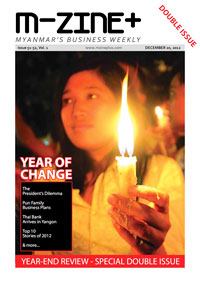The education sector in Burma is badly in need of funds; the country’s telecommunications infrastructure is one of the poorest in the world. But the two markets are being married in Burma through a new project initiated by Swedish mobile phone giant Ericsson.
 The Connect To Learn education initiative, which uses mobile broadband technology to connect classrooms, aims to allow both teachers and students access to up-to-date information to assist with their education.
The Connect To Learn education initiative, which uses mobile broadband technology to connect classrooms, aims to allow both teachers and students access to up-to-date information to assist with their education.
“Myanmar is one of the countries least touched by the mobile revolution and the possibilities for development are amazing,” said Ericsson’s Vice President of Sustainability and Corporate Responsibility, Elaine Weidman-Grunewald, speaking to Mizzima’s sister publication, M-ZINE+, in Rangoon recently.
“We’re actively looking at the business opportunities and hope that a year from now we will have a Connect To Learn project running in a school and we can start to look at how we can impact on education,” she said.
Headmaster Myo Nyunt said his Rangoon school wants to be part of Burma’s ICT revolution. “Everyone in the world wants to have access to information,” he said. “We want Internet.”
Connect To Learn is a partnership between the Earth Institute at Colombia University, an NGO called Millennium Promise and Ericsson. On the ground, Ericsson works in collaboration with local operators and NGOs to implement the initiative, which is now active in 11 countries, including Ghana, Uganda and Kenya.
“We go where we find the interest because we work in partnership with our customers—the mobile operators,” Weidman-Grunewald told M-ZINE+.
“We can provide the access and certain technical capabilities, but we want to work with the operators to give discounted or in some cases free bandwidth for a couple of years until we get this initiative to take off,” she said.
Burma’s telecommunications sector is currently controlled by a single operator: the government-owned Myanmar Post and Telecommunications, which enjoys a monopoly on mobile and fixed-line services.
But as part of the government’s “road map” to telecommunications sector reforms, it’s tipped that four licenses will soon be created and foreign operators will have the opportunity to finally enter what is potentially one of the country’s most lucrative industries.


